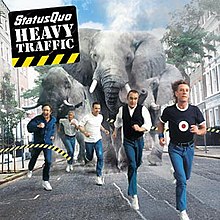The next time I really zeroed in on a Cross composition was when I encountered 'Sailing' in this episode of the always-excellent Channel 101 series Yacht Rock. For those unaware of Yacht Rock, I urge you leave this blog immediately and do something truly worthwhile, ie, binge watch the series on YouTube from start to finish. Please come back though.
Review: For all my heavy metal posturing (yeah, I saw Steve Grimmett's Grim Reaper this weekend), I really do love a bit of gleam and polish every now and again. I don't mean the flat, clippy, mechanically precise products of the Pro-Tools generation. However, give me a touch of pop sophistication, a dash of craftsmanship and perhaps Michael McDonald doing backing vocals and we're talking. Hall and Oates, Supertramp, Boz Scaggs (come on guy, 'Lido Shuffle' is just about perfect), Cate Brothers, Toto - these are my people. I prostrate myself at the altar of Donald Fagen and Walter Becker, and Steely Dan continuously vie with Blue Oyster Cult for the laurels of the coveted 'my favwite band evah' award.
Oddly, my enjoyment of the yacht rock genre (such as it has been called) means that I might actually be cool for once in my life, as this rather excitable and confused apologia argues. I don't buy it. Virtually every popular music genre undergoes a process of reappraisal at some point or another, with contemporary artists hip to the cause paying tribute in their work. All trends, including those that ride a wave of retro-nostalgia, eventually wane, leaving behind their artefacts for subsequent generations to (re)discover. Put more simply still, there's some enduringly great yacht rock out there. And I reckon that Christopher Cross is amongst the best.
You may have heard the story of how the formerly unheralded Fleetwood Mac roadie came from nowhere to sweep the 1980 Grammy Awards. Have you listened to the album recently? It's disgustingly good. Almost too pretty. There's not a hint of grit or a rough edge in sight. From start to finish it's like gorgeously delicious caramel is dripping from your speakers; you want to gorge on the almost too-rich sound. You've got Cross' soaring, strangely disembodied voice. You've got 'tasteful' brass parts. Lush arrangements. Congas. Hooks. Michael McDonald. Don Henley (the Eagles), J.D. Souther, Larry Carlton (Steely Dan), Victor Feldman (loads of people, plus Steely Dan) and Eric Johnson (Eric Johnson) all lend a hand too but the real mustard, as any fool knows (or believes), is a Michael McDonald backing vocal.
I don't think I'm being unfair when I say that Christopher Cross is a vacuous record. I'm not ascribing any negative connotations to that quality, as this is all surface; a pearlescent, refulgent surface, glowing pink and orange in a Malibu sunset. And that's not to say that Cross is a crap lyricist or anything. In fact, where Cross triumphs is the marriage of some fairly cute, albeit standard, sentiments about love (found, lost or unrequited) with the perfect musical accompaniment. Thus 'Poor Shirley' never sounds mawkish, and 'The Light Is On' is sketched with just enough mystery and apprehension, not to mention a superb chorus, to help it over the line that separates genius from stupidity.
As an aside, I should mention that my CD contains a quote from Mr Cross himself, recreated here in full because of its utter superfluity:
I'm a very nonpolitical and nonintellectual lyricist. But people have so many demands on them already in their lives. I'm just trying to give them a little enjoyment and relaxation.Seriously Christopher, there is nothing - nothing - remotely controversial on the album. Nobody is confusing you with Billy Bragg or Skrewdriver. Nobody is going to start a white supremacist group after listening to 'Sailing'. The only time Cross sounds vaguely pugilistic is on 'Ride Like The Wind', a soft rock classic, featuring the wimpiest man in the world boasting about having a gun and never going to church. The final flourish is the soulful, doleful 'Minstrel Gigolo', sketching a seemingly enviable life of adulation but sung in the manner of a man down to his last pina colada, chalk-blue sports jacket slung over one shoulder. It is, as with everything else on the record, immaculate. Essential.


